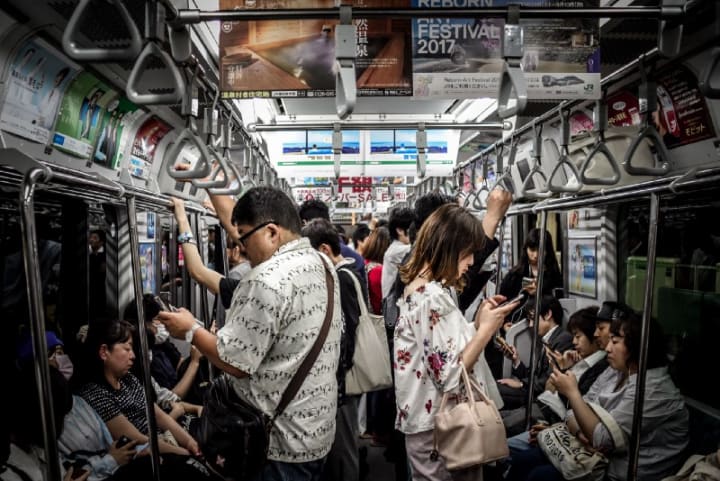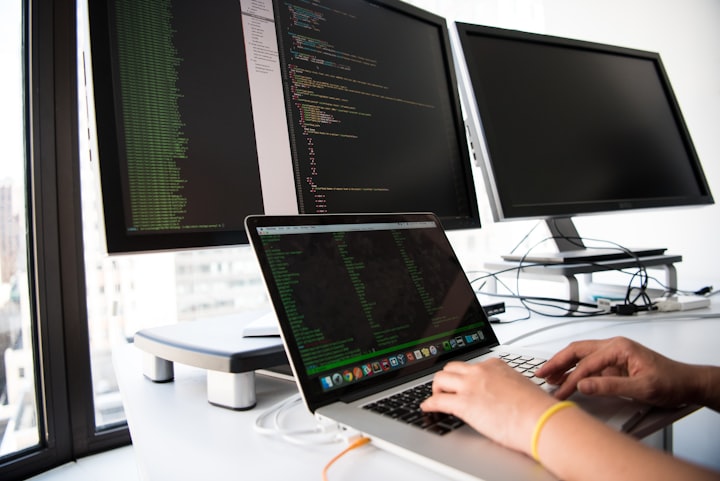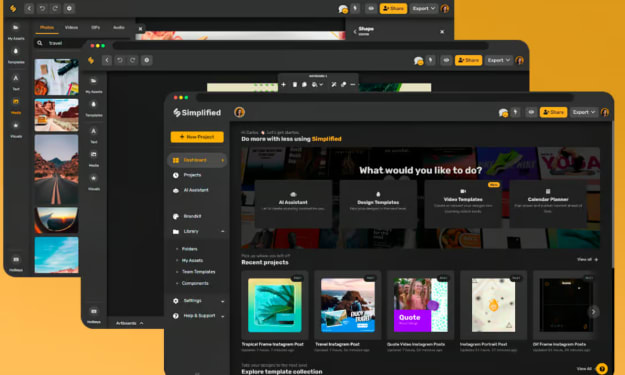Social Media Making You Antisocial
5 Reasons to support my claim.

The web of social media has grasped our minds more firmly than the Spiderman webbing the villains in his movies.
If we compare our real image with that portrayed on the interactive media platforms, we would be shocked by the difference. Wouldn't we?
So, have we become less socially active in our everyday lives because we try to post everything on the internet?
Has social media changed our ways of communicating with people?
Do we text or call someone instead of taking a walk across the room to talk to that same person?
Do we prefer facetime or Snapchat instead of having social gatherings at our home?
I guess many of us have answered affirmatively to most or all of these questions and that is the real cause of our mental health issues.
The Present Scenario

If we try to have a birds-eye view of the present situation, we find that people from all walks of life, spread across different age groups have been using social media, either for leisure purposes or for staying connected with their loved ones.
But, the irony is, none of the reasons to be on social media platforms are justifiable!
According to a survey conducted in 2019, 9 out of 10 Americans were found to be virtually active on social networking sites. This was an eye shocker.
Also, this survey made a clear indication that barring the newborns, almost everyone was socially active on the internet in one way or the other.
I have even heard people say that they have a social media image to maintain, which implies that they live a real and virtual life at the same time.
We have become two-faced humans. One face for real life and one for virtual.
It is rightly said that "One can not sail in two boats at the same time".
Likewise, human values have suffered a lot and so has the quality of our lives as a result of our two-faced attitudinal behaviors. We have a sophisticated image to portray on the internet while reality speaks differently.
Everyone desires to become the center of attraction for some unknown reasons. I guess it is a human tendency or we are being taught to believe so. Hence, targeting these weak points of human minds, social media platforms have flourished massively in a very short time.
If we closely look at the statistics of the past decade, we would ascertain that the technologies in the form of interactive multimedia have escalated exponentially. And so has the new types of mental illnesses and psychosomatic diseases. Moreover, the cases of depression and anxiety have been competing to touch skies, it seems.
On the other hand, the crime rate in the form of physical violence, religious intolerances, cyber abuses, sexual exploitations, vandalisms, illogical protests, etc has also been on a rampage lately, across the globe.
So, let us study some of our so-called normal behavior that has resulted from social media. By doing so, we can prevent our mental health from further deteriorating.
1. The Alienating Behavior
In the race of remaining socially active on virtual platforms, people have started living like aliens. Everyone is so deeply engrossed in their mobile screens satisfying their fat virtual egos, that they could hardly notice the world around them.
Sometimes, people can't even notice that the person, whom they are talking to or chatting with on the phone, is standing right next to them. We can visually encounter such experiences in public places like restaurants or public transports.
Photo by Hugh Han on UnsplashMoreover, we experience it on a daily basis that we can talk elaborately to a stranger sitting behind the walls of screens. But as soon as this curtain of virtual reality drops and if that person happens to meet us, we are not able to utter a single word.
It looks like virtually extroverts got magically transformed into real introverts.
2. Friends Are Turning Foes

We have become so mentally fragile that even someone not liking our picture on Facebook or Instagram can spoil our mood. As soon as the picture or post gets uploaded onto the online world, the mental calculations of likes and comments start germinating in our minds.
If the results are not according to our expectations, we experience a state of mental unrest and start inhibiting a hostile attitude.
Consequently, under the influence of this feeling of animosity towards the non-liker friends, we either unfriend them, block them, or start avoiding them in real life.
It looks like(Virtual)friends turn(real) foes.
3. "The Comparison and Competition " Attitude

Very lately, we have developed a comparing and competing attitude in our behavior. Whatever we see on the media platforms, we crave for it. We want everything, ranging from techno-savvy gadgets to a hair clip if it has been posted by our online friends.
If we are not able to achieve those luxuries, we even start hating our lives. As a consequence, all the kind of negative feelings like jealousy, insecurity, and intolerance perpetuates in our mind.
Sometimes, people use the means of networking sites to seek revenge by committing cyber crimes and cyber abuses. The victims often suffer from mental anxiety and depression as a result of this. Many even succumb to this pressure and end their lives. How pity!
4. The Erratic and Irrational Behavior
Primarily, the content on the virtual media is often uncontrollable and remains unfiltered for teenagers and toddlers. Due to this, pure and innocent souls get exposed to explicit visual images not suitable for their age and mental growth.
Secondarily, the open and easy access to pornography, hateful crime movies, and extremely disturbing online games, is leaving a deep and long-lasting effect on the younger minds.
Consequently, kids and teenagers feel the unnecessary urge to enact those scenes in real life as being portrayed in movies. There is also a study done by psychologists at Harvard University demonstrating that the kids who play aggressive and intense online games filled with outrageous content, grow up to develop those same traits in their behavior.
Therefore, the minors committing mass shootings, rapes, drug abuses, vandalisms, etc in the United States every year are the perfect example of our unnoticed side of the present upbringing.
5. FOMO (Fear of Missing Out)

A new mental illness called "FOMO" (fear of missing out) has widely gripped most of us. It is a kind of illness, where one always feels the necessity to be active on the hypermedia platforms just for the sake of "acceptance".
One of the major reasons for FOMO is people judging one another on the basis of their virtual personalities.
Because of FOMO, people get glued to Facebook, Instagram, Snapchat, Youtube, Twitter, etc, and try to follow the trends which they even don't relate to.
Very recently, many social media trends have been found to be detrimental and have been even banned by law. The famous KIKI Challenge (dancing to a song while being filmed from a moving vehicle), Kylie lip challenge(putting the mouth inside the container and suck the air out of it, in order to make the lips fuller like Kylie Jenner), Nillu Nillu challenge(dancing in front of moving car or trains), the Blue whale challenge (instigating the teenagers to undertake decisions and prompting them to end their lives), etc are just some of the examples that are born out of FOMO.
Moreover, under the influence of FOMO, some people have even recorded their intimate moments with their partners and made a sex tape only to look cool amongst their virtual friends and garner their attention.
Also, we have downgraded to such an extent that we even poke fun of people for not using social media platforms.
Last Thoughts
We all know that excess of anything is harmful and the live example is in front of us. Social interactive platforms are not at all bad if used wisely. There are many activists who have used this scientific technology as a boon for spreading positivity without getting affected by its hazards.
So we must moderate our usage because knowingly or unknowingly, we are becoming what we are reading, listening to, and watching on social media.
Social media are like black holes.
Many biologists have confirmed the relation of anti-social behavior with that of online media invasion. They have stated in their research that anti-social behavior is mainly governed by the brain damage caused by continued exposure to violence, crimes, fearful scenes, and FOMO.
Moreover, people would agree to the fact that emotional stimulus present on the internet community like political unrest, religious intolerance, fearful and fake news, has forced them to do things which they never intended to. This is validated by many psychologists because the neurological deficit makes the mind weak and vulnerable to be easily influenced in performing anti-social behavior.
Hence, if you have also envisaged a change in your lifestyle or have developed anger, anxiety, stress, and depression lately, I would suggest you check your social media usage. Because checking is changing.
P.S.Thanks for reading and stay happy, safe, and positive until next time.
About the Creator
DARSHAK RANA
✦ Darshak Rana is a Writer, Poet, Mechanical Engineer, Chef, Reader, and Entrepreneuer ✦ He writes about Life, Productivity, Relationships, Life Lessons, Mental Health, Psychology, and Spirituality. ✦ 10X Top writer on Medium platform






Comments
There are no comments for this story
Be the first to respond and start the conversation.